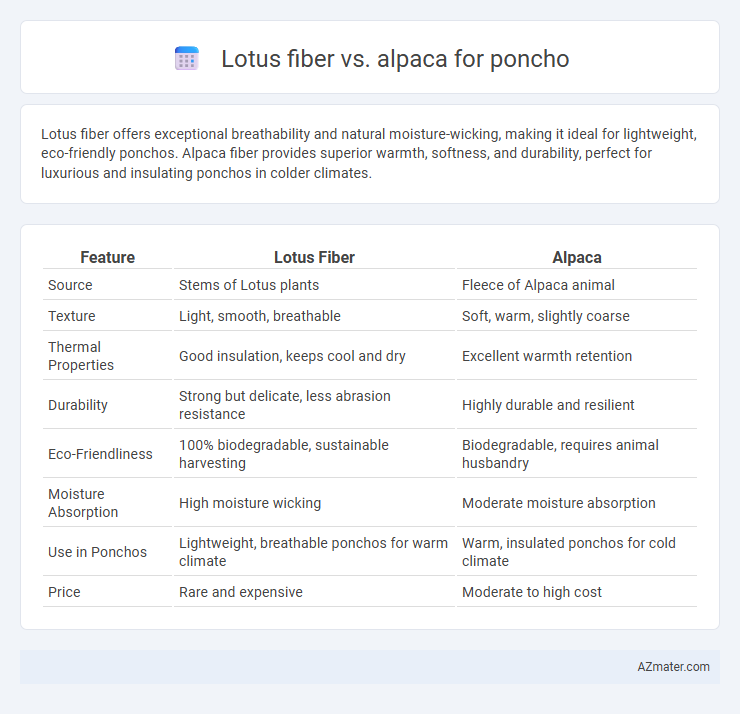Lotus fiber offers exceptional breathability and natural moisture-wicking, making it ideal for lightweight, eco-friendly ponchos. Alpaca fiber provides superior warmth, softness, and durability, perfect for luxurious and insulating ponchos in colder climates.
Table of Comparison
| Feature | Lotus Fiber | Alpaca |
|---|---|---|
| Source | Stems of Lotus plants | Fleece of Alpaca animal |
| Texture | Light, smooth, breathable | Soft, warm, slightly coarse |
| Thermal Properties | Good insulation, keeps cool and dry | Excellent warmth retention |
| Durability | Strong but delicate, less abrasion resistance | Highly durable and resilient |
| Eco-Friendliness | 100% biodegradable, sustainable harvesting | Biodegradable, requires animal husbandry |
| Moisture Absorption | High moisture wicking | Moderate moisture absorption |
| Use in Ponchos | Lightweight, breathable ponchos for warm climate | Warm, insulated ponchos for cold climate |
| Price | Rare and expensive | Moderate to high cost |
Introduction to Lotus Fiber and Alpaca
Lotus fiber, derived from the lotus plant's stem, is a rare and eco-friendly material known for its lightweight, breathable, and moisture-wicking properties, making it ideal for sustainable ponchos. Alpaca fiber, sourced from the alpaca animal native to the Andes, is prized for its softness, warmth, and hypoallergenic qualities, offering superior insulation and comfort in cold weather ponchos. Both fibers bring unique natural benefits; lotus fiber excels in ventilation and eco-sustainability, while alpaca provides exceptional thermal regulation and softness.
Origins and Production Processes
Lotus fiber is derived from the stems of the lotus plant, primarily harvested in regions like Myanmar and Thailand, where the fiber extraction involves a labor-intensive process of hand-stripping and sun-drying the fibers. Alpaca fiber comes from the fleece of alpacas native to the Andes Mountains in Peru and Bolivia, with a production process centered on shearing, washing, and spinning the soft, insulating fibers. Both fibers offer sustainable qualities, but lotus fiber's rarity and manual extraction contrast with alpaca's established wool industry and large-scale production methods.
Sustainability and Environmental Impact
Lotus fiber and alpaca wool are both sustainable materials for ponchos, with lotus fiber offering exceptional biodegradability and requiring minimal water and pesticides during cultivation. Alpaca wool is renewable and naturally insulating, produced with lower greenhouse gas emissions compared to traditional livestock, making it eco-friendly. Choosing lotus fiber or alpaca wool supports environmentally responsible fashion by reducing reliance on synthetic fibers and promoting sustainable agricultural practices.
Texture and Comfort Comparison
Lotus fiber offers a unique texture with its smooth, breathable fibers that create a lightweight and cooling poncho, ideal for warm climates. Alpaca fiber provides superior softness and warmth due to its fine, dense hairs, making it perfect for cozy, insulating ponchos in colder weather. The choice between lotus and alpaca fibers depends on the desired balance of comfort, breathability, and warmth in the poncho's texture.
Warmth and Insulation Properties
Lotus fiber offers excellent breathability and moisture-wicking properties while providing moderate insulation, making it suitable for lightweight ponchos in mild climates. Alpaca fiber excels in warmth and insulation due to its hollow core structure, which traps heat effectively, making alpaca ponchos ideal for cold weather conditions. Comparing the two, alpaca fibers generally deliver superior thermal retention, whereas lotus fibers prioritize comfort and lightweight insulation.
Durability and Longevity
Lotus fiber offers exceptional durability and longevity due to its natural strength and resistance to wear, making it ideal for ponchos that need to withstand frequent use. Alpaca fiber, while softer and warmer, is also durable but may experience pilling over time, which can affect its appearance and lifespan. Choosing lotus fiber results in a poncho with long-lasting structural integrity, whereas alpaca provides comfort with moderate durability.
Maintenance and Care Requirements
Lotus fiber requires delicate hand washing with mild detergent to maintain its natural luster and strength, avoiding prolonged exposure to sunlight for color preservation. Alpaca fiber is low-maintenance, often needing gentle cold-water washing or dry cleaning to prevent felting and retains softness without frequent treatment. Both materials benefit from air drying flat to preserve shape and texture, but alpaca is generally more resistant to pilling and shrinkage compared to lotus fiber.
Allergenicity and Skin Sensitivity
Lotus fiber offers hypoallergenic properties and is suitable for sensitive skin due to its natural antibacterial and breathable qualities, reducing irritation risks in ponchos. Alpaca fiber, while soft and warm, contains lanolin, which can cause allergic reactions in some individuals with sensitive skin. Choosing lotus fiber ponchos benefits those prone to allergies or skin sensitivity by minimizing potential irritants compared to alpaca options.
Price and Market Availability
Lotus fiber ponchos typically range from $150 to $300, reflecting the labor-intensive extraction process and limited supply, making them rarer in the market. Alpaca ponchos, priced between $80 and $200, benefit from widespread availability due to established farming in Peru and Bolivia, resulting in more competitive pricing. Market demand for alpaca ponchos remains strong because of their softness and durability, while lotus fiber products appeal to niche buyers seeking eco-friendly luxury.
Best Choice for Poncho: Lotus Fiber or Alpaca?
Lotus fiber offers exceptional breathability, moisture-wicking properties, and eco-friendly sustainability, making it ideal for lightweight, breathable ponchos suited for warm climates. Alpaca fiber provides superior warmth, softness, and durability, perfect for cozy, insulating ponchos designed for cold weather usage. Choosing between lotus fiber and alpaca depends on the desired poncho function: prefer lotus for lightweight comfort and environmental benefits or alpaca for warmth and luxury in cold conditions.

Infographic: Lotus fiber vs Alpaca for Poncho
 azmater.com
azmater.com